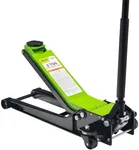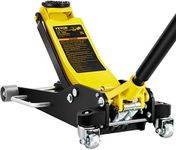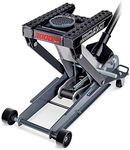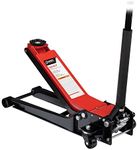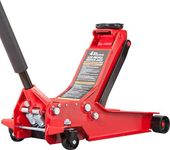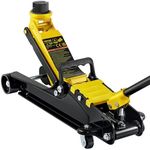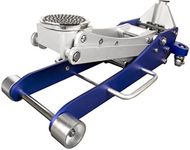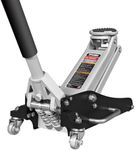Buying Guide for the Best Floor Jacks
Choosing the right floor jack is important for anyone who needs to lift a vehicle safely and efficiently, whether for maintenance, repairs, or tire changes. The best floor jack for you will depend on the type of vehicles you work with, how often you use the jack, and where you plan to use it. Understanding the key specifications will help you make a confident and safe choice.Lifting CapacityLifting capacity refers to the maximum weight the floor jack can safely lift, usually measured in tons. This is crucial because using a jack with too low a capacity for your vehicle can be dangerous. Floor jacks typically range from 1.5 tons to 4 tons. For small cars, a 1.5 to 2-ton jack is often sufficient, while larger vehicles like SUVs and trucks may require a 3-ton or higher capacity. Always check your vehicle's weight and choose a jack that can handle more than that weight for safety.
Lifting Range (Minimum and Maximum Height)The lifting range tells you how low the jack can go and how high it can lift. This is important because you need the jack to fit under your vehicle and also lift it high enough for your needs. Low-profile jacks can fit under cars with low ground clearance, while standard jacks may not. The maximum height should be enough to allow you to work comfortably or change a tire. Consider your vehicle's clearance and the tasks you plan to do when choosing the right lifting range.
Jack Type (Hydraulic, Scissor, Bottle)There are different types of floor jacks, each with its own strengths. Hydraulic floor jacks are common in garages and are easy to use, offering smooth lifting with a handle. Scissor jacks are compact and often come with cars for emergency tire changes, but they require more effort to operate. Bottle jacks are powerful and compact but may not fit under low vehicles. Think about where and how you’ll use the jack—if you need portability, a scissor or bottle jack might be best, but for frequent use in a garage, a hydraulic jack is usually preferred.
Weight and PortabilityThe weight of the jack affects how easy it is to move and store. Heavier jacks are usually more stable and durable, but they can be difficult to transport. Lighter jacks are easier to carry and store, making them good for roadside emergencies. If you plan to keep the jack in your garage, weight may not be a big concern, but if you need to take it with you, look for a lighter, more portable model.
Build Material and DurabilityFloor jacks are made from materials like steel or aluminum. Steel jacks are strong and durable, suitable for heavy-duty use, but they are heavier. Aluminum jacks are lighter and easier to handle, but may not be as robust for frequent, heavy lifting. Consider how often you’ll use the jack and in what conditions—if you need something for regular, tough jobs, steel is a good choice; for occasional or portable use, aluminum may be better.
Safety FeaturesSafety features such as overload protection, wide bases, and secure locking mechanisms are important to prevent accidents. Overload protection stops the jack from lifting more than it can handle, while a wide base provides stability. Some jacks have rubber pads to protect your vehicle. Always look for these features to ensure safe operation, especially if you’re new to using floor jacks.
